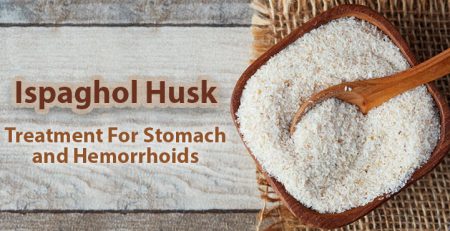Ispaghol
Psyllium husk (Ispaghol) is the best herb that is used to treat stomach related diseases. The word “Ispaghol” or “Ispaghula” is derived from the two words of Persian, Isap, and Ghulam means horse ear and this is because of its shape like horse’ ear.
Plantago is a genus that has more than 200 species. The dried ripe seed of Plantago Ispaghol, Plantago Indica, and Plantago Ovata belongs to the Plantaginaceae family, used in medicines to treat stomach related issues and ailments.
Ispaghol (Psyllium husk) is widely used as a home remedy for years for treating various kinds of diseases such as chronic constipation, gastric problems, gastrointestinal, genitourinary related issues, stomach ulcer as well as gonorrhea, piles, etc. (Gitanjali Deokar, 2016, vol 3, (Issue 1). There are three types of Ispaghol based on their colors, such as white, red, and black. Only white ispaghol is edible.
The seeds bulge out after placing it into the mouth or in water. The covering layer of its seeds is famously known as Saboos Isapghol, which is considered good for the treatment of acute and chronic constipation and irregular bowel moments. The taste of seeds is insipid and mucilaginous. (Anju, 2018).
Dietary Supplement
Normally, people use Ispaghol as a dietary supplement. Ispaghol is available in the forms of granules, husk, capsules, or powder. There are lots of manufactured products that fortify breakfast cereals and baked items with Ispaghol.
Ispaghol is easily soluble in water and becomes a thick and glutinous compound that resists digestion in the small intestine and because of its resistance to digestion, it helps in regulating the blood sugar, cholesterol, and triglyceride levels in the human body.
Its resistance to digestion allows it to help regulate high cholesterol, triglycerides, and blood sugar levels. However, another health advantage of taking Ispaghol is that it can help in weight management and also alleviate the symptoms of constipation and diarrhea. (Arlene Semeco, 2020).
Isapghol (Psyllium husk) is used as an internal wound healing herbal medicine for the stomach and intestines from ancient times. The World Health Organization (WHO) approved this as a laxative. (Anju, 2018)
Isabgol Benefits
1. Constipation
Ispaghol is a natural laxative. It helps in relieving constipation by binding partially digested food passing through the stomach to small intestines. (Arlene Semeco, 2020).
Another benefit of Ispaghol is that it produces an unfermented gel that functions as a palliative and unguent providing easy passage of stools. (Gitanjali Deokar, 2016, vol 3, (Issue 1). Ispaghol is the Best herbal treatment for constipation and also helps in passing out stools in a normal way. (Arlene Semeco, 2020).
A study showed that Ispaghol had a greater effect as compared to wheat chaff, because it is easy soluble fiber, however on the other side, the wheat chuff is insoluble fiber. (Arlene Semeco, 2020).
It has been observed that Ispaghol in clinical trials has repeatedly reported considerably amplified stool moisture levels, as well as wet and dry stool weight in healthy subjects as well as in patients with gastrointestinal problems. (Gitanjali Deokar, 2016, vol 3, (Issue 1)).
One more study was carried out, showed that taking 5.1g of Saboos Ispaghol twice a day for 2 weeks significantly increases the water content and weight of stools, as well as the total number of bowel movements, in 170 individuals with chronic constipation. (Arlene Semeco, 2020).
Dosage For Constipation
Adults:
1-2 teaspoons 2-3 times a day with a glass of water, milk, or curd.
Children:
Half teaspoon 2-3 times a day with a glass of water, milk, or curd.
2. Hemorrhoids
With the known benefit of Saboos Ispaghol for both constipation and diarrhea, it is also of benefit for hemorrhoids related issues. Patients with hemorrhoids have seen a significant reduction in hemorrhoid related bleeding after taking Ispaghol. (A. Bhattacharya, 2009). It also treats liver congestion and has a cooling effect on the human body.
DOSAGE FOR HEMORRHOIDS
In hemorrhoids, the average dose is about 2 teaspoons of this Caboose Ispaghol with water or buttermilk three times a day for 4-5 months. (Anupama, 2015).
3. Lower Blood Sugar Levels
Caboose Ispaghol works better than other fibers in lowering the blood sugar levels. The gel-forming fibers in Saboos Ispaghol can decelerate the food digestion, which provides helps in regulating the blood sugar levels. According to a study where 51 type-2 diabetes patients with constipation were given 10 g of Saboos Ispaghol twice per day and the results were remarkable. Not only the symptoms of constipation have been reduced, but also the bodyweight, sugar, and cholesterol levels have also been reduced down to their normal levels.
DOSAGE FOR BLOOD SUGAR LEVELS
The average dose of Saboos Ispaghol(Psyllium husk) for lowering blood sugar levels is 5 g twice a day, half an hour before breakfast and dinner. It helps in reducing fasting plasma glucose (FBS) and HbA1c (Glycosylated hemoglobin). (Anupama, 2015).
4. Lower Cholesterol Levels
Caboose Ispaghol (Psyllium husk) connects to fat and bile acids, helping the body to expel them. In one study, taking 5.1 g of Saboos Ispaghol twice a day for eight weeks resulted in decreased LDL-cholesterol levels, as well as an increase in HDL levels in 49 people with type-2 diabetes. Furthermore, another study showed, 47 healthy participants experienced a 6% reduction in LDL (bad) cholesterol after taking 6g of Saboos Ispaghol each day for six weeks. (Arlene Semeco, 2020)
5. Good For The Heart Health
Almost all types of fiber are good for cardiovascular health. The American Heart Association (AHA) stated that dietary fiber can improve cholesterol levels, and lower the risk of heart disease, stroke, type-2 diabetes, and obesity. (Arlene Semeco, 2020).
6. Controlling Hunger
Controlling hunger between meals is a challenge for many individuals. Moreover, ispaghol intake can affect satiety by decreasing hunger, increasing fullness, and reducing the desire to eat between meals. (Jose M.Bruma, 2016).
7. Ulcerative Colitis
A study was performed on patients with colorectal cancer. They were given 20 g of Ispaghol Musalam daily for three months, the results showed an increase of 42% in butyric acid production, which was decreased to pre-treatment levels within two months of cessation of supplementation. In a trial, the patients were given Ispaghol Musalam for ulcerative colitis problems, 10 g twice daily was as effective as Mesalamine in maintaining remission. (A. Bhattacharya, 2009).
Important Things to Consider Regarding Ispaghol
- Ispaghol is an over-the-counter (OTC) completely natural bulk laxative.
- Pregnant and breastfeeding women can also take Ispaghol.
- Ispaghol is safe and well-tolerated in patients with type-II diabetes. It improves glycemic control.
- Eat only recommended dosage along with water or milk.
- Additionally, it is important to increase fluid intake when using Ispaghol as the husk contains high fiber volume.
- Sudden increases in dietary fiber can cause temporary Gas and bloat, therefore start with a low dose and increase it gradually to help the gastrointestinal (GI) tract to get used to it. (Anupama, 2015).
Bibliography
A.Bhattacharya, V. K. (2009). Isabgol Husk: A Herbal Remedy for Human Health. Journal of Pharmacy Research.
Anju, M. I. (2018). A Versatile Unani Drug: Isabgol (Plantago ovata). International Journal of Pharmacy & Pharmaceutical Research, 12 (4), 11.
Anupama. (2015, July 15). Know the Isabgol Benefits, Side effects, and Dosage. Retrieved from bimbima (Daily life experience of Health, Ayurveda, Medicines, complementary therapies.): https://www.bimbima.com/ayurveda/know-the-isabgol-benefits-side-effects-and-dosage/223/
Arlene Semeco, M. R. (2020, May 15). Medical News Today. Retrieved from https://www.medicalnewstoday.com: https://www.medicalnewstoday.com/articles/318707
Gitanjali Deokar, S. K. (2016, vol 3, (Issue 1)). Pharmaceutical benefits of Plantago ovate (Isabgol seed): a review. PHARMACEUTICAL AND BIOLOGICAL EVALUATIONS, 9.
Jose M.Bruma, R. D. (2016). Satiety effects of psyllium in healthy volunteers. Appetite, 27-36.




